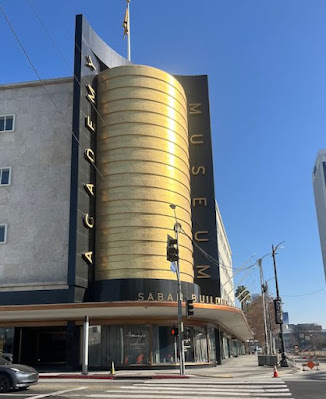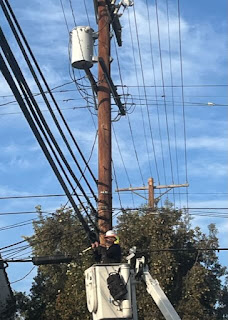Notice that I didn't say, "The Winners." Awards is a little better. There are objective criteria, but if the technical quality is more or less equal, and the content is good, and the story - whether a narrative or a documentary - is compelling and well told, then picking who gets an award and who doesn't gets subjective. The topic is one you are interested in. You 'like' the actors. The story touches close to home.
But awards play an important role for the film makers. They can use them as evidence that people liked their film. It gets the attention of other festivals and distributors.
As I went through the list, I've added a √ to the movies I thought were really good and I agree it was deserving. But I didn't see all of the films, so no √ doesn't mean I didn't like them. In fact, I think all the film makers - particularly those who completed features - have accomplished something noteworthy. They've managed to pull together a story, a cast, a crew, funding, and pulled off, despite the odds, a full length movie. That's like running a dozen marathons. Even if there are flaws, it's still a huge achievement and my respect and gratitude goes out to all the filmmakers whose films we saw this last week.
So with that preface, here's the email filmmakers got this morning from the directors of AIFF2025.[But the photos are mine.]
25th - ANCHORAGE INTERNATIONAL FILM FESTIVAL WINNERS
JURY AWARDS
 |
| Burt at guitar |
Narrative Feature -
Burt - Joe Burke
Documentary Feature - Remaining Native - Paige Bethmann √
Made In Alaska [Narrartive] Feature - The Ladder - Emilio Torres
Made In Alaska Doc Feature - K'etniyi: The Land Is Speaking to Us - Rory Banyard
 |
Wáats'asdíyei Joe
and Nayak'aq Yaahl
Yates |
Made in Alaska Narrative Short -
My Message To You - 'Wáats'asdiyei Joe Yates √
Made In Alaska Doc Short - Carving Lines - Dimitri Surnim
International Feature - The World Outside - Katrine Eichberger, Nikolas Mühe √
Humanitarian Award - Hidden Roots - Brad Hilwig √
Narrative Short - The Singers - Sam Davis
 |
| Josefin Kuschela |
Documentary Short - Greenland: Living with the Inuit - Josefin Kuschela
International Short - Pierre West - Henrik Larson, Jakob Arevarn
Anchorage Wolverines Sports Documentary Award - Bonnie Thunders: That Beautiful Moment - Corey Bayes
Anchorage Wolverines Sports Short Documentary Award: Shaped By Land - Emily Sullivan
Music Documentary: Goddess Of Slide - Alfonoso Maiorana
Music Video: Begin Again - Ava Acres and Matt Farren tied with Ideal Distance - Danny Chandia
Pilot: Bad Survivor - Alex Dvorak , Katie North
iPhone Super Short - Mom And Max - Jade Song
Animation Short: A Little Story About Forever - Max Romey √
 |
Katrine Eichberger and
Nikolas Mühe |
Director of Narrative Feature: Katrine Eichberger, Nikolas Mühe -
The World
Outside √
Director of Documentary Feature: Ryan Flynn - You're No Indian √
Director of a Narrative Short: Chelsea Christer - Out For Delivery
 |
| Carrie Lederer |
Director of Documentary Short: Carrie Lederer -
Wild Horses at the Door √
Actor in a Feature film - Laurence Shou for Rosemead √ and Burt Berger for Burt
Actress in a Feature film - Katrine Eichberger for The World Outside √ and Renne Gagner for I've Seen All I Need To See
 |
I've Seen All I Need To See
Team |
Independent Voice Narrative -
I've Seen All I Need to See, Zeshaan Younus, tied with
Lockjaw - Sabrina Greco
Independent Voice Documentary - Blood and Guts, Katie Green and Caryle Rubin
Reel World Impact Award: Comparsa, Vickie Curtis, Doug Anderson, Lesli Pérez and Lupe Pérez √
 |
| Greg Rubner |
Comedy Short: What The Heck is Going On. - Greg Rubner
Thriller Short: Hide - Brenden Hubbard
Explorer's Club Alaska Chapter Recognition Awards
Exploration Documentary - The Bride of Mont Blanc - Grace T.S.P.
Exploration Documentary - In Search of the Arctic Fox - Zach Hellmuth
Exploration Documentary - Ashes of the Mountain - Joseph Lindley
Exploration Ethics Documentary - Special Recognition Award - Among Thieves - Dr. Gino Caspari and Trevor Wallace √
Explorer's Achievement Award: The Last Dive, Cody Sheehy and Terry Kennedy
Native Voices Legends Awards:
Jerry Laktonen - Culture Bearer (For reviving Alutiiq Mask-making)
Velma Wallis: Storyteller (Author of Two Old Women)
AUDIENCE AWARDS
 |
| Ryan Flynn |
Narrative Feature -
Rosemead - Eric Lin √
Documentary Feature - You're No Indian - Ryan Flynn √
International Feature - The Mariana Trench - Elieen Byrne
 |
| Emilio Torres |
Made In Alaska Feature Narrative - The Ladder - Emilio Torres √
Made In Alaska Documentary Feature - K'etniyi: The Land Is Speaking to Us - Rory Banyard
Made in Alaska Narrative Short - Matt Megan and Mike dont give an F about Codependency - Justin Lawrence Hoyt, Matt Jardin
Made In Alaska Documentary Short - Sunrise Summer - Ian Mayer, Erin K Stein
Narrative Short - The Singers - Sam Davis
Documentary Short - Greenland: Living with the Inuit - Josefin Kuschela
International Narrative Short - Hearts of Stone - Tom Van Avermaet
Music Video - Soiree - Hannah Claire McDaniel
Animation - A Little Story About Forever - Max Romey √
SCREENPLAYS
Feature Screenplay:
Pangea Ultima - by Estevan Padilla -TIED with Mythomania by Nick Jones
Short Screenplay
Parking by Andrew Klaus-Vineyard
Pilot Script
Betty Lee Is Missing by Alysson Morgan
In the past, I've sometimes blogged the awards as they were announced. But in the past there were far fewer awards. There was:
Winner, Runner Up, and Honorable Mention
in four or five categories - Narrative and Documentary Features, Narrative and Documentary Shorts, Made in Alaska. These categories held for Jury Awards (from the judges within the Festival organizers, or film makers they reached out to), and Audience Awards - based on the ballots the audience marked after each showing.
Sometimes the jurors came up with a special award to recognize an outstanding film that had some unique qualities and/or that didn't quite fit into the festival's categories.
As I said above, awards play an important role in the post production struggle to get your film seen by audiences and even make some money. So I think having more awards is good, but there are limits. A festival doesn't want to be known as giving awards to everyone, because then the awards mean nothing. Just getting accepted into a festival is a major achievement.
I hope to follow up with my thoughts on some of my favorite films of the festival.





















 We went to the LA County Museum of Art on Thursday. And passed this bit of graffiti on the way. We also passed an Indian grocery store.
We went to the LA County Museum of Art on Thursday. And passed this bit of graffiti on the way. We also passed an Indian grocery store. 







